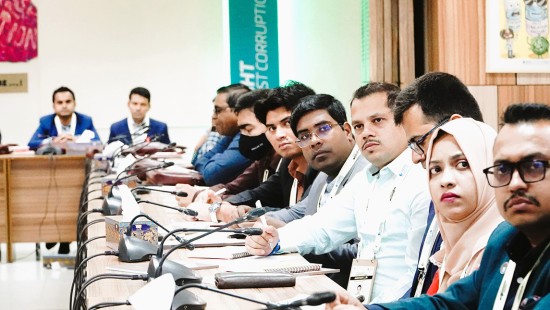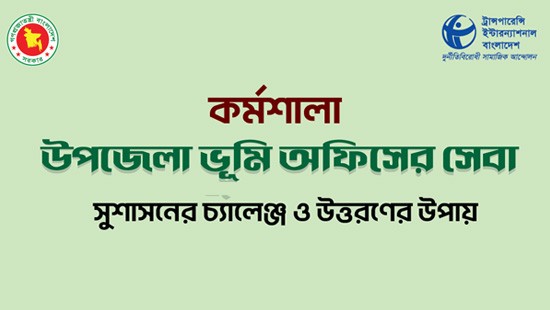Published: 27 February 2025
"The day I took office, an elderly man refused to discuss his land dispute with me. He simply stood up and declared he would return when a 'real officer' was available," recalls Rumana Afroze, an Upazila Nirbahi Officer (UNO) from Rajshahi Division. "Three years later, that same man now brings his granddaughter to my office, telling her, 'See, you can be like madam one day.'"
This transformation illustrates the quiet revolution taking place across Bangladesh's local governance landscape, where women administrators are not just breaking glass ceilings but reshaping the very foundation of public service. In Bangladesh, women UNOs face a complex web of challenges that extend far beyond their official job descriptions. Yet their perseverance is gradually changing perceptions, improving governance, and paving the way for a more equitable society.
Twenty-one women UNOs from eight divisions across Bangladesh gathered for a workshop on 27 February 2025 organized by Transparency International Bangladesh (TIB) in collaboration with the Cabinet Division. The event, titled "Sustainable Development Goals, Good Governance, and Women," marked International Women's Day 2025 and represented the seventh edition of an initiative that has trained 130 UNOs since 2017.
"We're constantly proving ourselves," shares Roni Khatun, a UNO from Khulna Division. "When I make a tough decision, it's attributed to emotional thinking. When my male colleague makes the same decision, it's called leadership."
Despite these hurdles, Dr. Iftekharuzzaman, TIB Executive Director, sees tremendous potential in these women leaders. "Corruption hampers good governance, while establishing good governance helps reduce corruption," he explained during his opening remarks. Research consistently shows that women tend to be more vocal against corruption, making their presence in administration crucial for achieving Sustainable Development Goal 16—promoting just, peaceful, and inclusive societies.
Mohammad Tauhidul Islam, TIB's Outreach and Communication Director, acknowledged this growing challenge of misinformation, particularly from unreliable media sources and unverified social media accounts. "The digital age has created new battlegrounds for integrity," he observed, emphasizing the need for media literacy and effective communication strategies.
Training Sessions on SDG, Gender and Governance
Perhaps the most valuable aspect of the workshop was the opportunity it provided for these women leaders to connect and share experiences. In small group discussions, they exchanged strategies for navigating both institutional and cultural barriers.
Human rights activist UM Habibun Nesa, who led the first session on gender equality and women's empowerment in governance, watched these exchanges with appreciation. "What you're doing here—supporting each other, sharing knowledge—this is how lasting change happens," she told the participants. "Each of you is a powerful changemaker in your community."
This sentiment was echoed by UNO Rinat Fouzia of Keraniganj, who expressed gratitude for the opportunity to share field-level experiences and gain deeper insights into the interconnection between governance and women's empowerment. "When I return to my upazila tomorrow, I go with new strategies and the knowledge that I'm not alone in this struggle."
The connection between women's leadership and ethical governance was further explored by Dr. Sumaiya Khair, Adviser Executive Management in the second session. "Women officials generally demonstrate stronger ethical values and have limited access to high-level corruption networks," she noted, explaining why women in governance positions often show less involvement in corrupt practices. But this ethical stance comes with its own set of challenges. Many women UNOs reported becoming targets of misinformation campaigns when they attempted to enforce transparency measures.
Dr. Khair also highlighted the systemic challenges women in governance face, including patriarchal dominance and cultural resistance. “The artificial barrier, the glass ceiling in administration, perpetuates gender inequalities in the workplace, affecting both women officials and the citizens they serve.” She urged women UNOs to challenge stereotypes, advocate for inclusive leadership, and ensure a gender parity mindset to break these barriers.
The Ripple Effect
The impact of women UNOs extends far beyond administrative efficiency. In many communities, they represent the first time local citizens have interacted with women in positions of authority. "A mother once brought her teenage daughter to meet me," shares UNO Ummey Salma of Barguna. "She told me her daughter had started talking about studying public administration after seeing me chair a public meeting. These moments remind me why this work matters—we're changing what the next generation believes is possible."
Dr. Iftekharuzzaman sees these individual stories as part of a larger narrative of national transformation. "Public servants and organizations like TIB share the same goal of serving the nation," he said in his closing remarks. "We will continue our policy advocacy to address the challenges raised by women UNOs and work towards establishing a transparent and inclusive governance system."
As the workshop concluded and these 21 women prepared to return to their respective upazilas, the sense of renewed purpose was palpable. They carry with them not just enhanced knowledge and skills, but something equally powerful—the assurance that their struggles and triumphs are part of a collective journey toward a more just and equitable Bangladesh.
In the words of one UNO as she departed: "We are not just administering districts; we are rewriting history—one decision, one community, one changed mind at a time."














